Enter the survival horror: how Resident Evil Remake surpasses its prequel
The Resident Evil series’ numerous remakes and remasters over the years raise some interesting questions over which versions you should make an effort to play, particularly in the early part of the series. Do you go for the “authentic” experience of the original PlayStation versions? The accessibility of the most modern remakes and remasters? And, most importantly in terms of today’s discussion specifically, should you play Resident Evil or Resident Evil Zero first?
For a lot of people, when it comes to a long-running series that jumps around in continuity over its lifespan, the answer is usually to play the games or watch the show in release order, since that is usually the order in which the work was intended to be experienced.
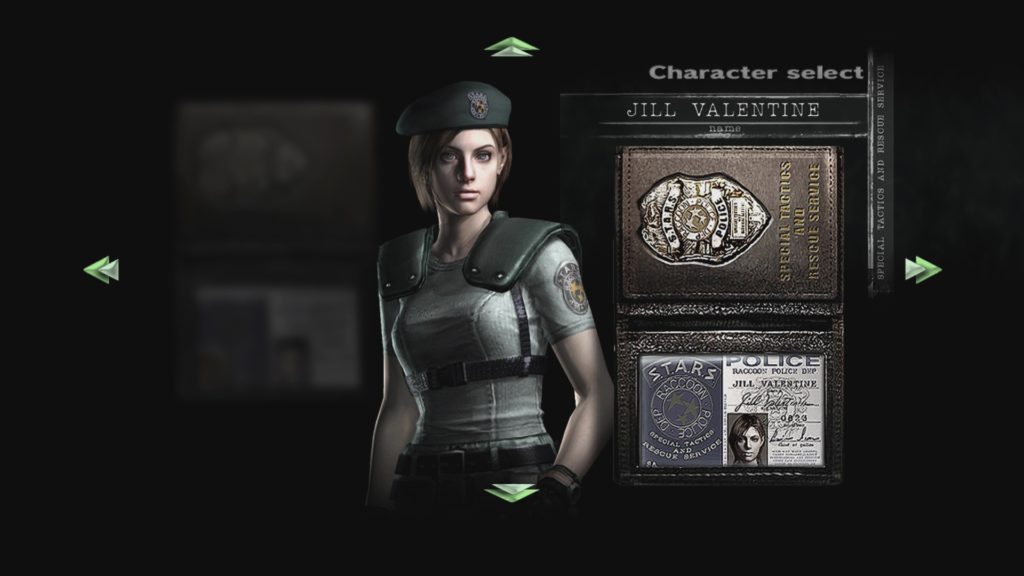
But in Resident Evil’s case, you might find it beneficial to jump in to Resident Evil Zero before the remake of the first Resident Evil — because despite the fact that Resident Evil Zero originally released later in the same year as Resident Evil Remake (as we shall refer to it hereafter), Resident Evil Remake actually provides a more polished, less clunky-feeling experience. And as such, once you’ve played Resident Evil Remake, you might find it hard to go “back” to Resident Evil Zero. If you see what I mean.
This isn’t to say Resident Evil Zero is a bad game or an experience that isn’t worthwhile, mind you; in fact, the relatively recent ports of Resident Evil Zero to modern platforms make it more accessible and enjoyable than ever, particularly with its modernised control scheme. But Resident Evil Remake is just an overall better balanced, more considerately designed game — and that makes it much more of a pleasure to play.
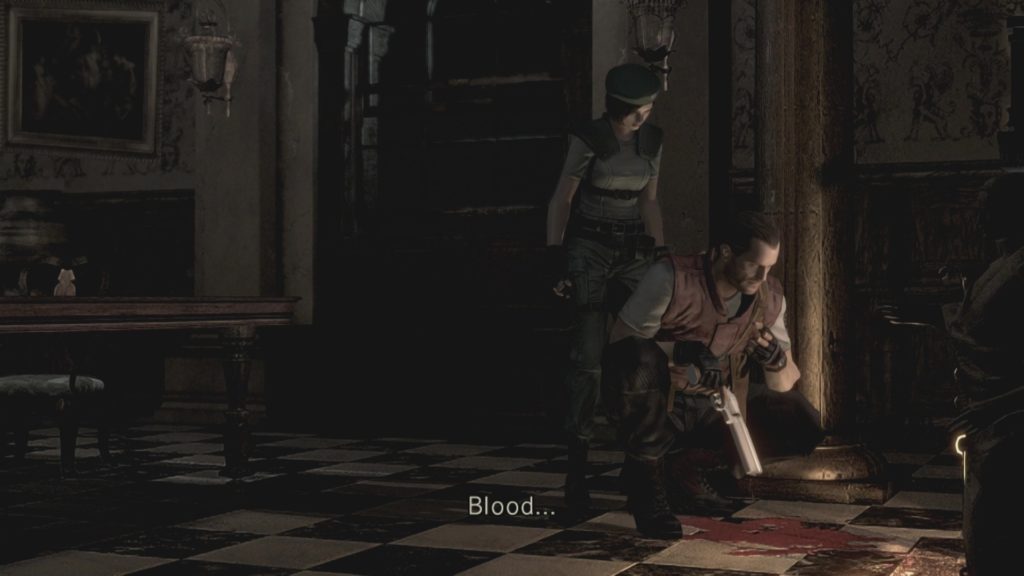
A lot of this stems from the fact that most of Resident Evil Remake unfolds in a relatively small geographical area: the Spencer mansion. Resident Evil Zero, meanwhile, initially takes place in its self-contained train sequence before moving into a surprisingly large interconnected world. The “training facility” map might initially resemble the Spencer mansion, but gradually reveals itself to be rather different. And the game is very fond of making it tricky to go back to places you’ve previously been once you’ve moved the story on — usually by dropping some unpleasantly tough enemies in your way.
Well, you might think, that’s no problem — just kill them. Except it’s not quite that simple in Resident Evil Zero; both ammunition and health items are in extremely short supply, meaning you need to think very carefully before expending either or both of them on encounters you can avoid. Of course, scarcity of resources is part of the very essence of classic-era survival horror, but it’s not hard to argue that Resident Evil Zero takes things just a little too far in this regard at times.
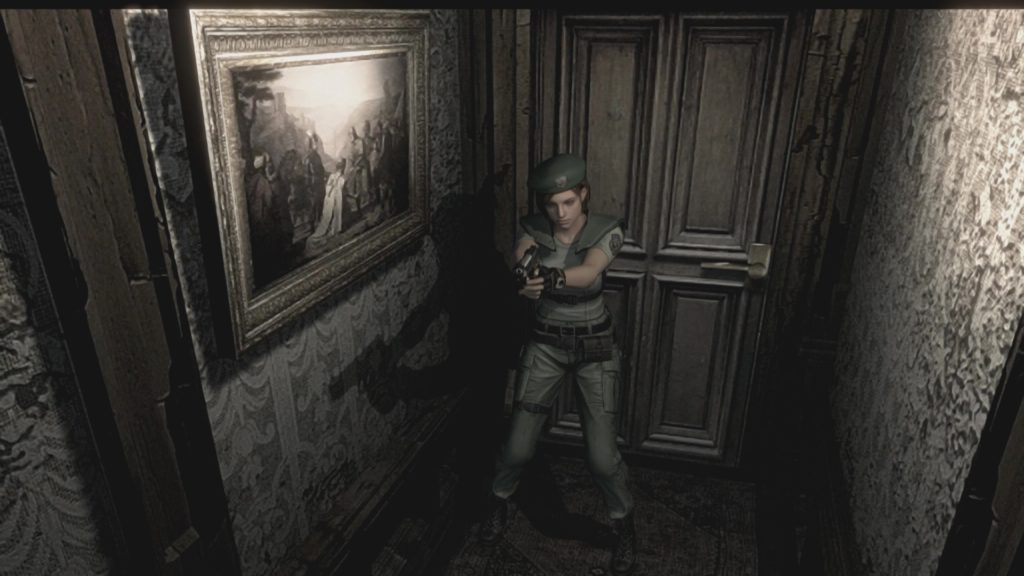
There absolutely is not enough ammunition in Resident Evil Zero to be able to kill everything in the game — outside of replays with bonus weapons, that is — and as such, it’s possible to get yourself into an unwinnable situation, even late in the story. This is why every time you reload a saved game, you’re prompted to confirm if you really want to try again, or if you actually want to start over from the very beginning and try to do a little better.
Contrast this with Resident Evil Remake, which, by comparison, bombards you with healing items and ammunition throughout the early part of the game, trusting you to stockpile accordingly for the challenges you will be facing later on. You can still potentially get yourself into an unwinnable situation, but it’s a lot more difficult to do so; at the same time, the game still provides sufficient punishment for backtracking too much with its “Crimson Head” zombie mutations who show up after you’ve left corpses unattended for too long.
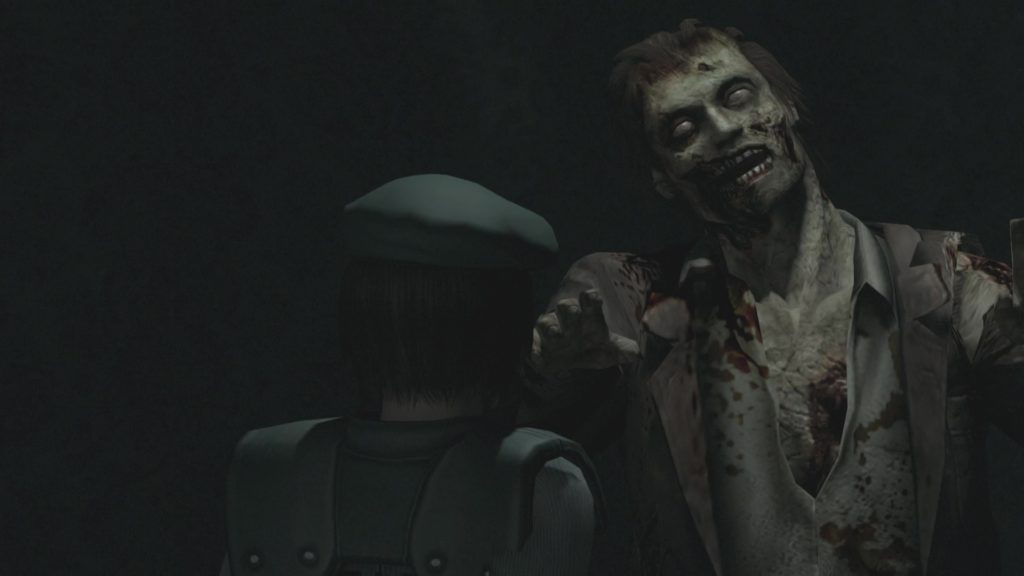
There’s a far better balance struck, however. There will be times during a Resident Evil Zero playthrough where it will feel like it’s impossible to return to certain locations due to the enemies lurking there; by contrast, in Resident Evil Remake, you can either prepare accordingly to prevent Crimson Head zombies from appearing in the first place (by burning corpses with the limited fuel available around the mansion) or deal with them in a suitably “final” manner by blowing their head off with a shotgun or a lucky critical from the handgun.
Hell, there are plenty of places Crimson Heads show up that are arranged in such a way that sensible manoeuvring will allow you to avoid them without having to attack them or endure their powerful assaults.
Part of the reason the two games feel so radically different in terms of overall design and structure despite their fundamental mechanics being pretty similar is down to one simple thing: the way you manage your inventory. In Resident Evil Zero, you drop items you don’t need, like in an old-school text adventure; in Resident Evil Remake, meanwhile, the only way to get rid of items you’ve picked up is to use them (in the case of consumables), put them where they’re supposed to be (in the case of key items) or dump them in an item box for later retrieval if you don’t need to or can’t do either of those things right now.
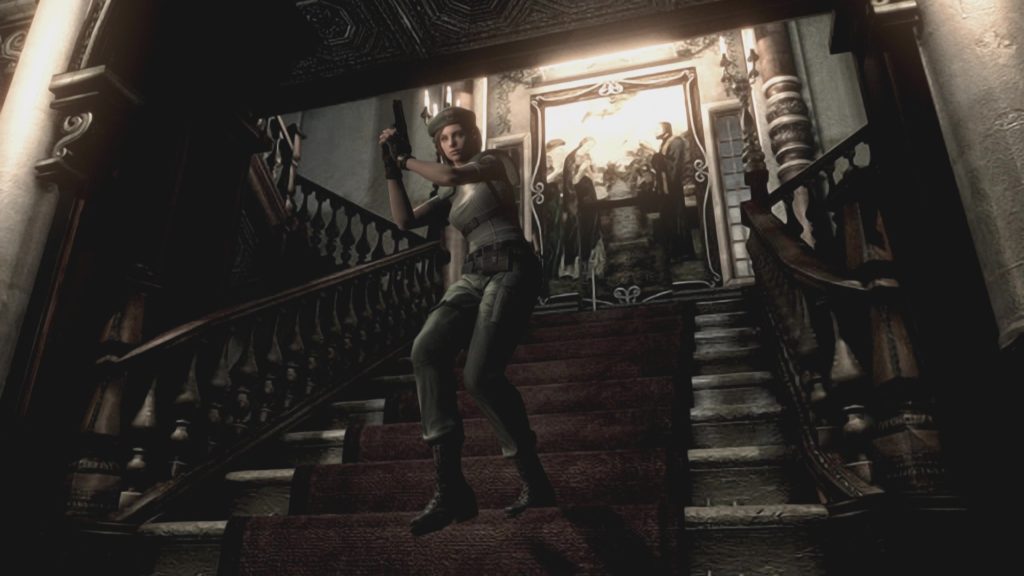
That latter aspect makes a huge difference. Because all the item boxes throughout Resident Evil Remake are interconnected (on the default difficulty settings, at least), you can pick up items when you first find them — assuming you have inventory space at the time — and then dump them in an item box to use later, even if “later” means “in a completely different part of the game world after several hours have passed”.
By contrast, in Resident Evil Zero, if you leave a particular item on the floor in the main hall of the Umbrella Training Facility, you’ll have to run all the way back to go and get it if you suddenly decide you need it — and you can bet there’ll be some bloodthirsty Eliminators scattered along your return route just waiting to snack on your squishy bits when you do. It’s not until the very end of the game that you unlock a much more convenient shortcut back to the early areas — and even then, most players will probably find themselves pressing onwards by this point.
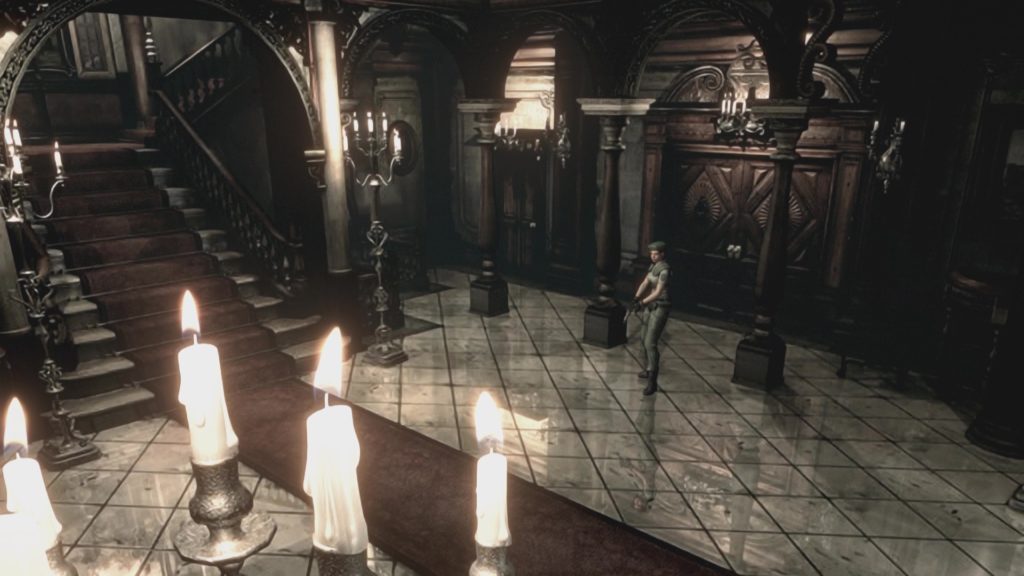
There’s an argument to be made that this adds an interesting additional layer to Resident Evil Zero’s gameplay in that you need to strategically place items in easy-to-reach locations so that you can retrieve them without hassle when needed. But in practice, it can easily become frustrating after a while; on your first run through the game, you have no clue where the powerful enemies are going to show up as the game progresses, so you have no real way of knowing what are the “easy-to-reach locations” you need.
And while this is presumably the exact reason that the “restart on reload” option exists in Zero, it takes a strong will and a very dedicated player to not lose patience with a game that demands you restart from the very beginning simply because you haven’t memorised things you haven’t seen yet! By contrast, Resident Evil Remake feels much more forgiving right from the outset, then escalates its challenge factor accordingly as you progress further into the story and the stakes are raised bit by bit.
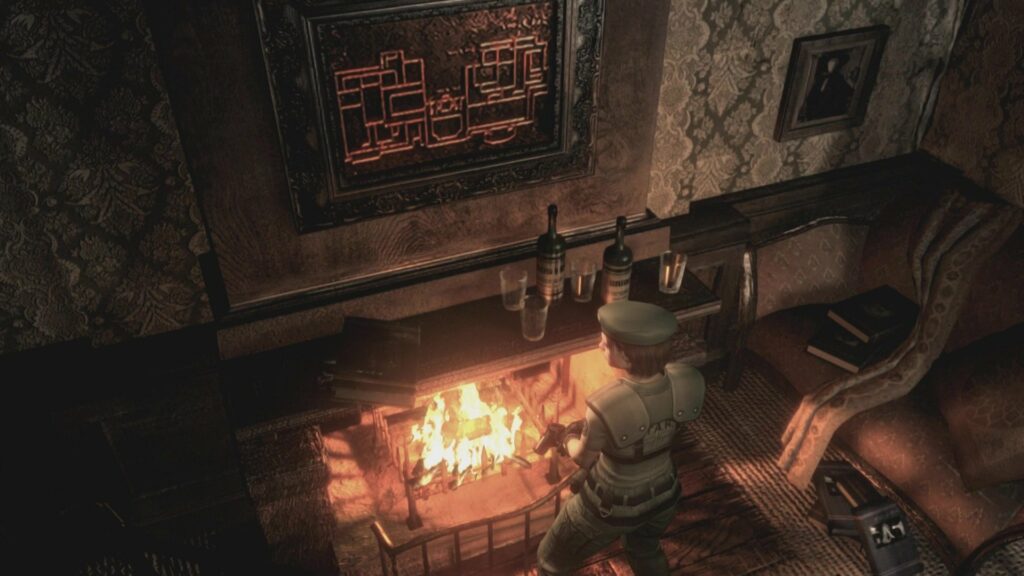
To reiterate: none of this is to say that Resident Evil Zero is a “bad” game or is worth passing up on; it may, however, make some people consider what order they want to play these games in if they’re new to the series as a whole.
You can look at it in two ways: you can play Resident Evil Zero first as the “true” beginning of the story, dealing with its difficulty and idiosyncrasies as a bit of a “trial by fire”, then reward yourself with Resident Evil Remake’s more friendly design. Alternatively, you could play Resident Evil Remake first to brush up on your skills, then take on the stiffer challenge that Resident Evil Zero offers, learning a bit about the backstory of the early part of the series in the process.
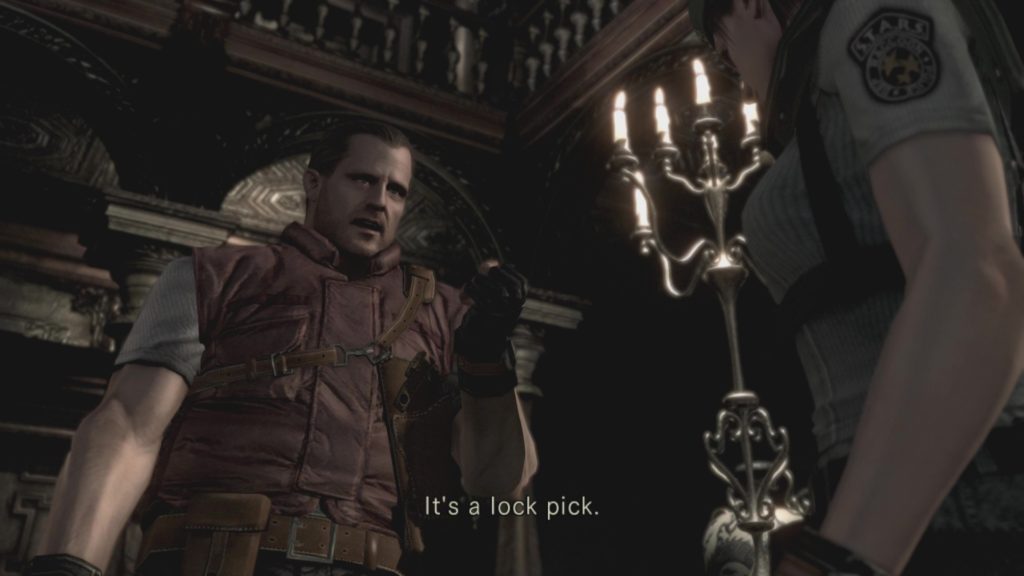
Both approaches are valid; it’s just a matter of what you prefer. Personally, I went for the former; while I enjoyed Resident Evil Zero, moving on to Resident Evil Remake has felt like a genuine reward for surviving the previous game’s challenges. Question is: will the much more recent Resident Evil 2 remake make me feel that same sense of “progression” — or will I hunger for the good old PlayStation days, “sorry about that, babe” and all?
I’ve got a mansion to clear of bioweapons first. And the Master of Unlocking waits for no man!
Join The Discussion
Rice Digital Discord
Rice Digital Twitter
Rice Digital Facebook
Or write us a letter for the Rice Digital Friday Letters Page by clicking here!
Disclosure: Some links in this article may be affiliate links, which means we may earn a small commission if you make a purchase after clicking on them. This is at no additional cost to you and helps support Rice Digital!
- Letter from the Editor: passing the torch - June 30, 2023
- Super Woden GP 2 is looking promising - June 30, 2023
- Inti Creates is making a 32 bit-style Love Live action platformer - June 26, 2023







